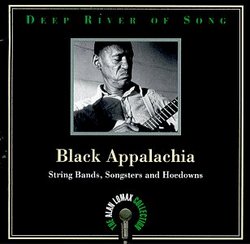Black timey music
Tony Thomas | SUNNY ISLES BEACH, FL USA | 11/09/2004
(5 out of 5 stars)
"Too much of the general view of socalled old time music comes from the suburban, middle class people, who retreat to it thinking they are getting to something so white, so "celtic" that culturally they are making the same flight from Black people musically that they have made residentially.
However, we pervade. This is real old time music, the Black music that is at the core and foundation of Southeastern American traditional music. You see it, you feel it, in all its glory right here.
This is the Black old time string band and dance music that was ignored by record companies that only wanted blues out of Black artists and by most folklorists who by an large were only interested in blues, work songs, or songs they in their narrow point of view could directly pin as African Survivals. This is a great broad survey to open you up to the music. After you see this, you will be impelled to search for more. A good help is my own listmania list on Old Time music from a Black point of view.
Last week, I kept just the first selection, Jimmy Strother's "Cripple Creek" repeating on my CD for a couple hours. It was not just the great banjo playing, but the lyrics with real meaning: "Read and Run, Read and Run, don't let the sundown catch you here," Strothers sings from inside a Virginia prison.
Syd Hemphil's recordings here are very important. Hemphil is not just a fiddler, a blues artist, a font of Mississippi folk tradition, but he was a leader in the African quills and drums, Mississippi Hill Country, fife and drum band tradition. Here Hemphil PlayS in a band of fiddle, banjo, guitar AND DRUM! Despite the attempts of the slave masters to surpress the drums for fear they would call us to rebellion, the drum remains integral to this music.
More well known because of the Altamont recordings is the John Lusk band one of the wildest, great string bands, Black and white of all time. I could go on and and on about every one of these selections. However, rather than reading more of my words, you need to listen to more of this music!
Many, including myself, have written about the limitations of John and Alan Lomax in their collection and writing and shaping of American traditional music through lenses they want it to be seen with. However,the more important point is they went out and found this music, recorded this music, made it breathe out to the public by their connection with the initial 1930s folk song movement, and Alan continued that association to his death a few years back!"


 Track Listings (22) - Disc #1
Track Listings (22) - Disc #1